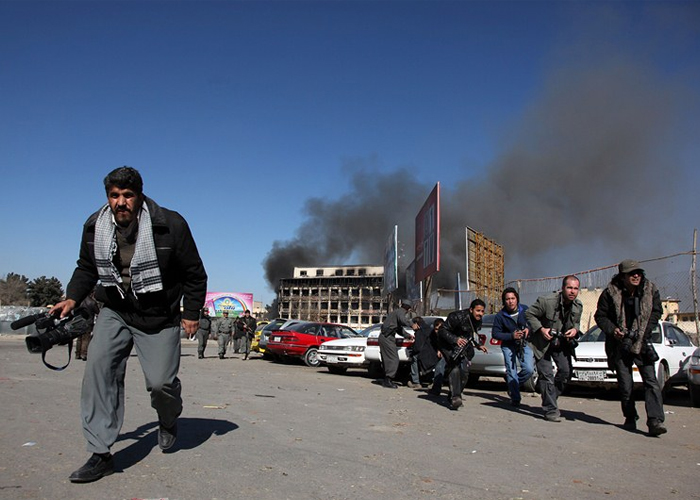Today, it is coincided with the 27th of Hoot (17 march), the National Day of Journalists in Afghanistan. Although this day is symbolically marked in various circles with the participation of government authorities, the rising challenges of journalists and media workers are not practically tackled. These challenges are not limited to the rise of violence and target killings but also pertained to the workplace, salaries, job security, working hours, warlord behavior, access to information, and journalist cases in the judiciary system, and so on. However, the violence has extremely increased against the journalist community in recent years. As a result, hundreds of journalists have been killed or injured while hundreds of others have left their jobs forever due to the rising violence in the country. The killing of three women media workers in the city of Jalalabad with their earlier colleague, Malalai Maiwad, and her driver can be named as a recent example of journalist victims in a single media in the country.
The rise of violence against journalists will not only impose a quantitative impact on the number of journalists in Afghanistan but also a qualitative impact on journalist’s work in the country. Hereafter, the Afghan journalists would increasingly resort to self-censorship due to fear that their reporting could be punished by the violence of armed and unarmed groups. Therefore, if we believe in democracy and democratic values, we should take serious measures for the protection of media journalists in the country noting that media considered the fourth pillar of a government in a democratic system. So, it is expected that human rights org and local citizens strongly support media and journalists to monitor social, political, or administrative issues, or else we should anticipate the downfall of media freedom in Afghanistan.
After security challenges, the second most important challenge of journalists is the difficulty of accessing information. Unfortunately, Afghanistan is one of the countries with minimum experience in sharing information; many of the government officials neither believe in sharing information, nor the culture of accessing information is institutionalized in the country. If a reporter wants to prepare a report on a simple issue, he or she should long wait behind the gates of the authorities for weeks and months but eventually, he/she has to return without getting the required information.
This is a fundamental problem in the country while according to Article 50 of the Afghan Constitution, “Right to Know” or “Right of Access to Information” is a fundamental right for every Afghan citizen. The right of access to information will not only increases transparency and accountability with the elimination of corruption but also enhances social inclusion and good governance through public participation. Therefore, the government and other affiliated organizations must show a serious will to institutionalize the practices of article 50 of the constitution in the country.
The Next most important challenge of journalists is job insecurity. Almost all Afghan media outlets have a negative track record of supporting journalists as employees. A journalist is not yet recognized as an employee in the journalistic and media community in the country. Despite the fact that in recent years journalists have been subject to the Labor Law and the Civil Service Law, but the media organization have not given them the privileges of them as an employee. Over the years, there have been many cases in which the media workers have been illegally fired and then deprived of their rights and privileges defined in the law. For example, during the covid-19 the journalistic community was the only group that had given no rights and privileges after the media was mostly closed due the pandemic issues.
A more important and fundamental challenge is the lack of scientific and professional capacities in the educational centers of Afghanistan in the field of journalism. Unfortunately, most university graduates are not able to professional prepare research reports in the country. The systematic reports are always prepared and released by international organizations such as UNAMA, World Bank, transparency international, SIGAR, and so on while there are many journalists who have journalism documents but do not have the ability and capacity of such professional work in the country. Unfortunately, the higher education system in Afghanistan is only organized for educational activities, not research activities. In these centers, everything is based on education and training courses and almost all academic staff are following educational programs and often lack the motivation and opportunity to do research work or train research in the country. In such contexts, it is necessary for policymakers to encourage and facilitate research programs for journalists in the educational centers or in the workplace.
Despite all these challenges, the journalists are true flag holders of freedom of expression, justice, and democracy in Afghanistan. As justice, transparency and democracy have a lot of enemies and oppositions in the country, the journalists have also a lot of enemies and oppositions in the country. In fact, the journalists are at the forefront of freedom of expression and the preservation of democratic values in Afghanistan.
Therefore, the work of journalists and the media community is no less important than the work of soldiers on the front lines. So, as much as we should praise and support our soldiers and our defense and security forces, we should also praise and appreciate the journalists who resist on the front lines of freedom of expression. Many of these freedom fighters have lost their sweet lives in recent years to institutionalize freedom of expression and other human and democratic values, but their families, siblings, and children left without necessary fiscal supports.
Home » Opinion » The National Day of Journalists and Challenges of Journalism in Afghanistan
The National Day of Journalists and Challenges of Journalism in Afghanistan
| Mohammad Zahir Akbari

